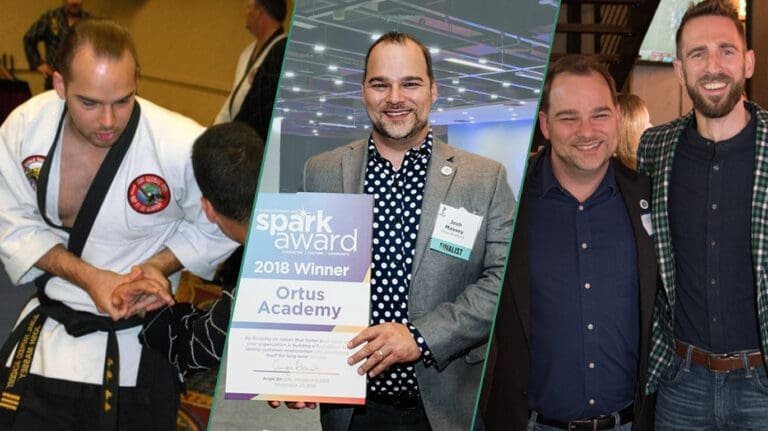Feeling Like a Fraud? Why Imposter Syndrome Is a Sign of Growth for Executive Leaders
It’s a familiar feeling for high-achievers. You just closed a major deal. You successfully navigated a complex project. Your team is singing your praises. Yet, in the quiet moments after the celebration, a nagging voice whispers, “When are they going to find out you don’t really know what you’re doing?”
If that voice sounds familiar, you’re not alone. Welcome to the club. It’s called Imposter Syndrome, and it’s not a fringe issue—it’s a near-universal experience for competent, driven leaders who are pushing themselves to grow.
In fact, if you feel this way, you’re in very good company. A recent report from the consulting firm Korn Ferry, featured in CNBC, found that a staggering 71% of CEOs in the US experience symptoms of imposter syndrome. The research doesn’t specifically mention COOs, but I could guess it is a similar percentage.
This article isn’t about “curing” imposter syndrome with cheap platitudes. It’s about understanding what it is, why it shows up, and how to reframe it as a powerful signal that you are on the right track. It’s about learning to manage the feeling so it fuels your growth instead of stunting it.
What Is Imposter Syndrome, Really?
At its core, imposter syndrome is the persistent inability to believe that your success is deserved or has been legitimately achieved as a result of your own efforts or skills. It’s a disconnect between the external reality of your success and your internal feeling of being a fraud. It’s the belief that your achievements are the result of luck, timing, or some misunderstanding, not your own skill or intelligence.
I recently spoke with a new client, a brilliant consultant with a 5-star Google rating and a waitlist of customers. During our call, she confessed her darkest secret: she felt like a fraud. When I pointed to her dozens of glowing reviews, she immediately said, “They’re just being nice.”
That is the voice of imposter syndrome. It’s a master storyteller who expertly discounts all evidence of your competence.
The Neurodivergent Amplifier: Why Imposter Syndrome Hits Differently With ADHD
For leaders with ADHD or other neurodivergent traits, imposter syndrome isn’t just a visitor; it can feel like a permanent resident. The experience is often amplified for a few key reasons:
- Emotional Intensity: Many neurodivergent individuals experience Rejection Sensitive Dysphoria (RSD), which is an extreme emotional sensitivity to perceived failure or criticism. A minor setback that a neurotypical person might brush off can feel like a catastrophic failure to you. This intense fear of “getting it wrong” is a powerful fuel for imposter syndrome.
- A Lifetime of “Masking”: From a young age, many of us learned to “mask,” to hide our challenges and work ten times harder just to keep up. This can create a deep-seated feeling of being a fraud because you feel like your “true” self, with all its struggles, is hidden from view. You worry that if people saw the real you, they’d realize you don’t belong.
- The Gap Between Ideas and Execution: An ADHD brain can generate brilliant, complex ideas in a flash. However, it often struggles with the linear, step-by-step process of execution. This can create a feeling that you haven’t truly “earned” your successes because the follow-through felt so difficult, even if the initial idea was yours.
Understanding that your brain is wired differently is the first step to giving yourself grace. You’re not imagining things—the feeling is more intense for you, and it requires a unique, compassionate set of tools to manage.
Consider This Post: ADHD Executive Coaching: A Playbook for the Modern Operator – For many leaders, feelings of imposter syndrome are deeply connected to the challenges of a neurodivergent brain. This guide helps you turn those challenges into your greatest strengths.
The 5 Common Faces of Imposter Syndrome
To manage this feeling, it first helps to understand how it shows up. Dr. Valerie Young, an internationally recognized expert on imposter syndrome & co-founder of Impostor Syndrome Institute, has identified five common “types” of imposter syndrome.
See if any of these feel familiar:
The Perfectionist:
They set impossibly high standards for themselves. A 99% success is seen as a failure. Because they believe they should be perfect, any small mistake is taken as evidence of their fraudulence.
The Superhuman:
Believe they should be able to handle every aspect of their role alone and work themselves to the point of burnout to prove their worth.
The Natural Genius:
Believes actual competence means everything should come easily and naturally. If they have to struggle or work hard to master a new skill, they feel like a fraud.
The Soloist:
Feels that asking for help is a sign of weakness and that they must accomplish everything on their own. This is a common trait among leaders caught in The Fixer’s Trap.
The Expert:
Constantly seeks new certifications or training because they fear they don’t know enough and will be “found out” as inexperienced.
Consider This Post: The Fixer’s Trap: Are You the Business Bottleneck? – One of the most common ways imposter syndrome shows up is in the need to “do it all” yourself. Learn how this “Fixer” behavior might be holding you and your company back. Take the free quiz to determine if you are the Fixer or the Designer.
My Own Imposter Syndrome: A Personal Story
I know this feeling intimately. As a leader with ADHD myself, although it was undiagnosed at the time, the pressure to be the ‘expert’ in a room full of millionaires was immense. Here is one story, of so many.
Some Background: A few years ago, I served as the COO of a financial intelligence company called Ortus Academy. We were a venture-backed company with approximately 15 people spread across the globe during the COVID-19 pandemic. Our core mission was to help people change their relationship with money and plan for their financial future, and we assisted over 10,000 students in doing so.
We were fortunate enough to be surrounded and supported by numerous self-made millionaires who served as our expert instructors.
And me? I didn’t have a million dollars in the bank. My wife and I “owned” our house, but that certainly wasn’t an investment. It was incredibly easy to feel like an impostor, and my team members and I spoke of it often.
But that experience taught me a profound lesson about value. Our role wasn’t to be the expert. The experts, for all their wisdom, didn’t know how to talk with beginners. Our students were intimidated by them. Our job was to be the bridge. Our value was in translating that high-level expertise and making it accessible. My role in this was to make sure everything ran smoothly.
Our value wasn’t in being the ultimate expert, but in translating that high-level expertise and making it accessible. This is true for you, too. Your value isn’t in knowing everything (remember the Hero Complex); it’s in connecting everything and being the ninja in the background that ensures it all works.
To be clear, this is only one story, there are many more. I struggle with imposter syndrome all the time, but I have learned to acknowledge the crow on my shoulder, greet it, and move past it – and you can too.

How to Reframe Imposter Syndrome as a Sign of Growth
It’s time to redefine what that feeling of being a fraud really means. That voice doesn’t show up when you’re coasting or doing something easy. It shows up when you are on the verge of something new, exciting, and challenging. It means you are pushing yourself, being a little risky, and stepping outside your comfort zone.
Imposter syndrome is not a sign of weakness; it’s a byproduct of your ambition.
It is a signal that you are exactly where growth happens.
Judith Humphrey, in her book, “Taking the Stage,” describes this feeling as our “inner crow,” cackling away, telling us we aren’t good enough. The goal isn’t to silence the crow—trying to do so is exhausting and often impossible. The goal is to learn how to acknowledge its cackling without letting it command your ship.
One of the most practical first steps is to arm yourself with undeniable data. Remember my client who thought her 5-star reviews were just people “being nice”? I call it “The Win File,” and it is the perfect counterpoint to that feeling. It’s not about seeking external validation to feel good; it’s about using objective evidence to fight an irrational internal narrative. It’s a tool to remind yourself that while your feelings of inadequacy are real, they are not based on the facts.
The “Win File”: Start a document today – Google Doc, a note on your phone, anything. Every time you get a piece of positive feedback, a compliment from your CEO or customers, a note of thanks from your team, a successful project launch – save it in this file. When the “impostor” voice gets loud, your job is to open the document and read it. It is tough for the feeling of being a fraud to survive in the face of overwhelming, objective evidence to the contrary.
Conclusion: You Are Not an Impostor, You Are an Explorer
In the end, you are not a fraud. You are an operational leader in a demanding role, often one you are defining as you go. You are a human being, not a guru from a YouTube video or a magazine cover. You will have successes and failures, and as I can tell you from experience, you will learn far more from the failures.
That voice of doubt, that inner crow, doesn’t mean you’re in the wrong place. It means you’re exactly where you need to be: on the edge of your comfort zone, where real learning and growth occur.
The goal isn’t to never feel like an impostor again. The goal is to have the tools and the mindset to hear that voice, thank it for trying to keep you safe, and then confidently take the next bold step forward anyway.
Ready to Stop Listening to the Crow on Your Shoulder?
That inner critic has been holding you back for too long, whispering that you’re not good enough and that you’re going to be “found out.” But that voice is a liar, and you don’t have to let it dictate your career.
The first step to silencing the crow is getting an objective, expert perspective. In a complimentary Clarity Call, we will untangle the feelings of self-doubt from the facts of your success. You will leave our conversation with a renewed sense of confidence and a clear, actionable first step to leading with the authority you’ve already earned.







